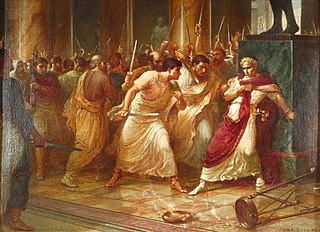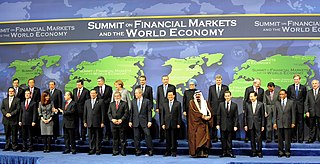 W
WThe dogs of war is a phrase spoken by Mark Antony in Act 3, Scene 1, line 273 of English playwright William Shakespeare's Julius Caesar: "Cry 'Havoc!', and let slip the dogs of war."
 W
WEt tu, Brute? is a Latin phrase literally meaning "and you, Brutus?" or "also you, Brutus?", often translated as "You as well, Brutus?", "You too, Brutus?", or "Even you, Brutus?". The quote appears in Act 3 Scene 1 of William Shakespeare's play Julius Caesar, where it is spoken by the Roman dictator Julius Caesar, at the moment of his assassination, to his friend Marcus Junius Brutus, upon recognizing him as one of the assassins. The first known occurrences of the phrase are said to be in two earlier Elizabethan plays; Henry VI, Part 3 by Shakespeare, and an even earlier play, Caesar Interfectus, by Richard Edes. The phrase is often used apart from the plays to signify an unexpected betrayal by a friend.
 W
W"Friends, Romans, countrymen, lend me your ears" is the first line of a speech by Mark Antony in the play Julius Caesar, by William Shakespeare. Occurring in Act III, scene II, it is one of the most famous lines in all of Shakespeare's works.
 W
WMartin Luther was a German professor of theology, priest, author, composer, former Augustinian monk, and is best known as a seminal figure in the Protestant Reformation and as the namesake of Lutheranism.
 W
WKaji was a title and position used by nobility of Gorkha Kingdom (1559–1768) and Kingdom of Nepal between 1768–1846. Many other contemporary kingdoms used the same title for their ministers.
 W
WThe phrase "scientia potentia est" is a Latin aphorism meaning "knowledge is power". It is commonly attributed to Sir Francis Bacon, although there is no known occurrence of this precise phrase in Bacon's English or Latin writings. However, the expression "ipsa scientia potestas est" occurs in Bacon's Meditationes Sacrae (1597). The exact phrase "scientia potentia est" was written for the first time in the 1668 version of the work Leviathan by Thomas Hobbes, who was a secretary to Bacon as a young man.
 W
WLiever Turks dan Paaps, also Liever Turksch dan Paus, was a Dutch slogan during the Dutch Revolt of the end of the 16th century. The slogan was used by the Dutch mercenary naval forces in their fight against Catholic Spain.
 W
WLutheranism is one of the largest branches of Protestantism that identifies with the teachings of Jesus Christ and was founded by Martin Luther, a 16th-century German monk and reformer whose efforts to reform the theology and practice of the Catholic church launched the Protestant Reformation. The reaction of the government and church authorities to the international spread of his writings, beginning with the 95 Theses, divided Western Christianity. During the Reformation, Lutheranism became the state religion of numerous states of Northern Europe, especially in northern Germany and the Nordic countries. Lutheran clergy became civil servants and the Lutheran churches became part of the state.
 W
WMachiavellianism as a concept, or "popular discourse", in political history is a term for the political philosophy of the Italian Renaissance diplomat Niccolò Machiavelli. Machiavellian ideology is often depicted as "godless, scheming and self-interested". In discussions of Machiavelli's thought "Machiavellian" and "Machiavellianism" are often used in reasoned critiques, also in general usage the terms more often occur in political polemic, suggesting an unprincipled lust for power, achieved through "subtle policie, cunning roguerie", by the "Machiavel", an adherent of these principles. In this idea, as described by Isaiah Berlin, Machiavelli was regarded as "a man inspired by the Devil to lead good men to their doom, the great subverter, the teacher of evil, le docteur de la scélératesse, the inspirer of St. Bartholomew’s Eve, the original of Iago".
 W
WTo be as "mad as a March hare" is an English idiomatic phrase derived from the observed antics, said to occur only in the March breeding season of the European hare. The phrase is an allusion that can be used to refer to any other animal or human who behaves in the excitable and unpredictable manner of a March hare.
 W
WThe Compromise of Nobles was a covenant of members of the lesser nobility in the Habsburg Netherlands who came together to submit a petition to the Regent Margaret of Parma on 5 April 1566, with the objective of obtaining a moderation of the placards against heresy in the Netherlands. This petition played a crucial role in the events leading up to the Dutch Revolt and the Eighty Years' War.
 W
WIn international relations, a middle power is a sovereign state that is not a great power nor a superpower, but still has large or moderate influence and international recognition.
 W
WHenry IV, also known by the epithet Good King Henry or Henry the Great, was King of Navarre from 1572 and King of France from 1589 to 1610. He was the first monarch of France from the House of Bourbon, a cadet branch of the Capetian dynasty. He was assassinated in 1610 by François Ravaillac, a Catholic, and was succeeded by his son Louis XIII.
 W
WThe phrase "scientia potentia est" is a Latin aphorism meaning "knowledge is power". It is commonly attributed to Sir Francis Bacon, although there is no known occurrence of this precise phrase in Bacon's English or Latin writings. However, the expression "ipsa scientia potestas est" occurs in Bacon's Meditationes Sacrae (1597). The exact phrase "scientia potentia est" was written for the first time in the 1668 version of the work Leviathan by Thomas Hobbes, who was a secretary to Bacon as a young man.
 W
WA utopia is an imaginary community or society that possesses highly desirable or nearly perfect qualities for its citizens. The term was coined by Sir Thomas More for his 1516 book Utopia, describing a fictional island society in the New World. However, the term can also denote actual experiments in what participants regard as a vastly superior manner of living, generally in what are termed intentional communities. In common parlance, the word or its adjectival form may be used synonymously with "impossible", "far-fetched" or "deluded".
 W
WWell-being, also known as wellness, prudential value or quality of life, refers to what is intrinsically valuable relative to someone. So the well-being of a person is what is ultimately good for this person, what is in the self-interest of this person. Well-being can refer to both positive and negative well-being. In its positive sense, it is sometimes contrasted with ill-being as its opposite. The term "subjective well-being" denotes how people experience and evaluate their lives, usually measured in relation to self-reported well-being obtained through questionnaires. Sometimes different types of well-being are distinguished, like mental well-being, physical well-being, economic wellbeing or emotional well-being. The different forms of well-being are often closely interlinked. For example, improved physical well-being is associated with improved emotional well-being. As another example, better economic well-being tends to be associated with better emotional well-being even in adverse situations such as the COVID-19 pandemic. Well-being plays a central role in ethics since what we ought to do depends, at least to some degree, on what would make someone's life go better or worse. According to welfarism, there are no other values besides well-being.
 W
WXmas is a common abbreviation of the word Christmas. It is sometimes pronounced, but Xmas, and variants such as Xtemass, originated as handwriting abbreviations for the typical pronunciation. The "X" comes from the Greek letter Chi, which is the first letter of the Greek word Christós, which became Christ in English. The suffix -mas is from the Latin-derived Old English word for Mass.